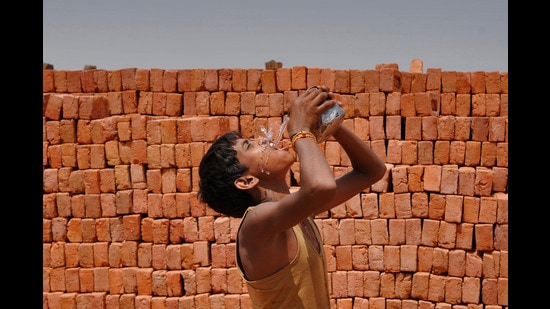Rising temperatures hold a dire warning
While these adaptation measures are needed immediately, a focus on mitigation (cutting down fossil fuel consumption and expanding renewable energy) has to intensify.
Days before the crucial United Nations-led climate meet COP27 begins in Egypt, a stark warning has been issued on the debilitating impact of rising temperatures on human health. According to the Lancet Countdown on Health and Climate Change: Health at the Mercy of Fossil Fuels, released on Tuesday, India reported 20,000 heat-related deaths in adults above 65 annually between 2000 and 2004, and the number grew to about 31,000 between 2017 and 2021. Globally, there were 190,000 heat deaths (2000-04). This increased to 310,000 deaths between 2017-21. According to the research team, exposure to extreme heat affects health and exacerbates underlying conditions such as cardiovascular and respiratory diseases, causes heat stroke, worsens sleep patterns, impacts mental health negatively and limits people’s capacity to work and exercise.

The study also revealed that in 2021-22, India witnessed record temperatures, indicating that worse is yet to come. The world is already at average warming of 1.1 degrees Celsius globally (over pre-industrial levels) and approximately 0.7 degree Celsius (on average) in India. Experts say that even 1.5 degrees Celsius global warming will increase extreme heat, make nights hotter, and also result in an increase in humidity in the Indian subcontinent, disproportionately affecting poor and vulnerable populations. Unfortunately, there is a lack of government data on heat-related deaths as most don’t get reported as such. And minus granular data, generating a conversation on heat and its severe impacts is difficult.
To tackle this challenge, India must improve its heat advisories. Currently, these are neither localised nor easily decipherable by at-risk communities and those involved in disaster response and planning. In addition, there has to be an intense focus on building or retrofitting homes to make them climate-resilient. There are many low-cost options to keep houses cool: Proper ventilation, sun shades above windows, reflectors on homes with tin roofs, or simply putting layers of vegetation on roofs. While these adaptation measures are needed immediately, a focus on mitigation (cutting down fossil fuel consumption and expanding renewable energy) has to intensify.
All Access.
One Subscription.
Get 360° coverage—from daily headlines
to 100 year archives.



HT App & Website






